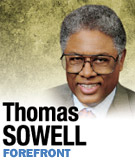Subscriber Benefit
As a subscriber you can listen to articles at work, in the car, or while you work out. Subscribe Now
 They say “all politics is local.” But economic decisions impact the whole economy and reverberate internationally. That is why politicians’ meddling with the economy creates so many disasters.
They say “all politics is local.” But economic decisions impact the whole economy and reverberate internationally. That is why politicians’ meddling with the economy creates so many disasters.
The time horizon of politics seldom reaches beyond the next election. But, in economics, when an oil company invests in oil explorations today, the oil they eventually find and process may not make its way to market and earn a profit until it is sold as gasoline a decade later.
In short, the focus of politicians is extremely limited in both space and time—and all the repercussions carry little, if any, weight in political decisions.
At one time, many state banking laws forbad a bank from having multiple branches. The goal was limited and local—namely, to prevent big, nationally known banks from setting up branches that many locally owned banks could not compete against.
But, limited and local as such state banking laws were, their impact was both national and catastrophic, when thousands of banks failed during the Great Depression of the 1930s. The vast majority of the failed banks were in states with laws against branch banking.
Why? Because, when there is a single bank in a single place, the fate of both its depositors and its borrowers depends on what happens there. If it is a wheat-growing region, a drop in the price of wheat means people deposit less money at the same time when more borrowers are unable to repay their loans.
Banks caught in that kind of crossfire went under on a scale that shrank the total amount of credit in the country and helped plunge the national economy into depression. In Canada, where banks were free to have branches across the country, not one bank failed during the same years when thousands of American banks failed—and Canada did not have deposit insurance until 1967.
A Canadian bank with branches in all sorts of places across the country—with all sorts of different industry, commerce and agriculture—had their risks spread, instead of being concentrated, as in the United States.
Our own more-recent housing boom and bust began when local politicians in various places began severely restricting the building of houses in the name of “open space,” “smart growth” or whatever other political slogans were in vogue.
As housing prices skyrocketed in such places as coastal California, both renters and home buyers often had to pay half their monthly income just to put a roof over their heads. This led to Washington politicians declaring a need for nationwide laws and policies to create “affordable housing,” even though people in most of the country were paying a lower share of their income for housing than in previous years.
This political crusade for “affordable housing” was at the heart of laws, regulations and even threats from the Department of Justice against mortgage lenders who failed to lend to as many low-income and minority borrowers as the politicians wanted them to.
Regardless of the additional problems that occurred as these mortgages were bought by Fannie Mae and Freddie Mac, or were later bundled into securities sold by Wall Street, the fundamental problem was that many people simply stopped making their mortgage payments—as was perfectly predictable when lending standards were forced down by the government.
The politicians and bureaucrats who forced lenders to lower their standards had limited goals in mind—namely affordable housing and more minority home ownership. But the repercussions when the housing markets collapsed spread all across the American economy and led to financial crises overseas, where financial securities based on American mortgages were widely sold.
All politics may be local but the repercussions reach around the world, and even extend to generations yet unborn, who will be left to cope with the national debts resulting from this debacle.
Quick fixes for the economy now are unlikely to get investors to make job-creating investments, which depend on long-term factors ignored by politicians who are focused on the 2012 elections.•
__________
Sowell is a senior fellow at the Hoover Institution. Send comments on this column to [email protected].
Please enable JavaScript to view this content.
